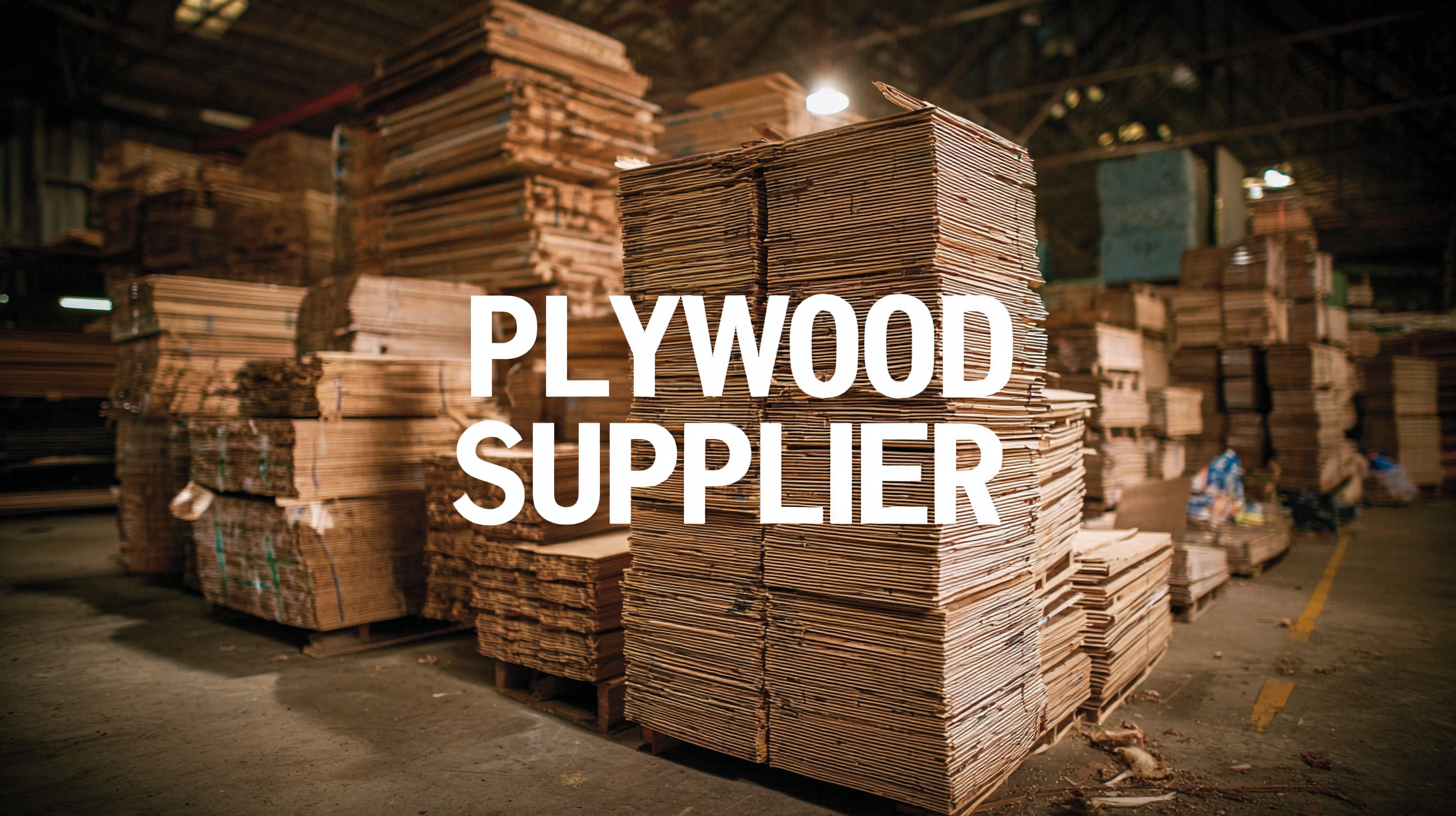 When embarking on a construction or crafting project, selecting the right materials is crucial, and one of the most important choices you'll make is choosing a reliable plywood supplier. With a myriad of options available in the market, it can be daunting to determine which supplier can meet your specific needs while ensuring quality, affordability, and timely delivery.
When embarking on a construction or crafting project, selecting the right materials is crucial, and one of the most important choices you'll make is choosing a reliable plywood supplier. With a myriad of options available in the market, it can be daunting to determine which supplier can meet your specific needs while ensuring quality, affordability, and timely delivery.
This ultimate guide aims to simplify your decision-making process by highlighting key factors and providing compelling reasons why the right plywood supplier can significantly impact the success of your project. From understanding the characteristics of different plywood types to evaluating supplier credentials, we'll explore essential considerations that will empower you to make an informed choice.
By the end of this guide, you'll have the knowledge you need to confidently partner with the best plywood supplier for your unique requirements, ensuring that your projects stand the test of time.
When selecting a plywood supplier, several critical factors should be considered to ensure you choose the best option for your projects. Firstly, it’s essential to evaluate the quality of the plywood offered. Look for suppliers who provide detailed specifications, including grades, thickness, and types of wood used. High-quality plywood not only enhances the durability of your projects but also contributes to a more aesthetically pleasing finish.
Another vital aspect is the supplier’s reputation in the industry. Researching customer reviews and testimonials can give you insights into their reliability and the overall service experience. A reputable supplier is likely to offer consistent quality, timely delivery, and good customer support, which are crucial for maintaining project timelines. Additionally, consider the range of products available. A supplier with a diverse selection of plywood types, such as marine-grade or fire-rated options, can meet various needs, making them a valuable partner in your woodworking endeavors.

When selecting the right type of plywood for your projects, understanding the various types available and their ideal applications is crucial. The most common types include hardwood plywood, softwood plywood, marine plywood, decorative plywood, and structural plywood. According to a report by Grand View Research, the global plywood market size is expected to reach $87.36 billion by 2027, reflecting its widespread use in construction and furniture industries.
Hardwood plywood is known for its durability and strength, making it ideal for high-quality furniture and cabinetry. Conversely, softwood plywood, often more affordable, is best suited for applications like sheathing and packaging. Meanwhile, marine plywood, with its water-resistant properties, is perfect for boat building and outdoor projects. A study by IBISWorld indicates that the demand for marine plywood has surged, increasing by 5.2% annually as more individuals engage in boating activities.
Decorative plywood caters to aesthetic preferences with fancy veneers, suitable for interior design projects. Lastly, structural plywood meets engineering requirements for building structures safely. In fact, the American Plywood Association notes that properly graded structural plywood can provide excellent load-bearing capabilities, essential for safe construction practices. Understanding these types can significantly influence the outcome of your project, ensuring both functionality and beauty.
When evaluating plywood quality and grades, it is crucial to understand the grading system established by the American Plywood Association (APA). The APA provides a comprehensive set of guidelines that categorize plywood into several grades based on criteria such as appearance, structural integrity, and resistance to moisture. For instance, exterior-grade plywood, which is treated for water resistance, typically falls into grades such as A, B, C, and D, where 'A' represents the highest quality with minimal defects and a smooth surface, ideal for visible projects. According to a 2021 report by Allied Market Research, the global plywood market was valued at approximately $57 billion, highlighting the increasing demand for high-quality products that meet specific project requirements.
Additionally, it’s important to consider the plywood's thickness, which can influence its durability and application. The industry standard suggests that thicker sheets provide better stability and load-bearing capacity, making them suitable for structural projects. Research from the Forest Products Laboratory indicates that plywood's tensile strength is significantly influenced by its grade; higher-grade plywood can withstand greater stress before failing. When choosing a supplier, ensure they have certifications and access to high-grade materials that meet these standards, as this can significantly affect the outcome of your projects.
When selecting a plywood supplier, it's essential to assess their reliability and customer service to ensure a smooth project execution. Supplier reliability can be gauged through their track record, delivery timelines, and consistency in product quality. Reach out to previous clients or look for testimonials that highlight their experiences. Additionally, consider suppliers that are transparent about their sourcing and manufacturing processes, as this reflects a commitment to ethical standards.
**Tips:** Always ask potential suppliers about their quality assurance protocols and how they handle issues like disputes or product defects. This will give you insights into their customer service responsiveness. Furthermore, make sure to inquire about their sustainability practices; suppliers committed to environmentally friendly labor will be more accountable in the long run, aligning with the growing demand for sustainable procurement.
Effective communication is another critical factor in supplier evaluation. A reliable supplier should be easy to reach and willing to provide ongoing support throughout your project. Establishing a good dialogue initially can indicate how well they will handle your orders once you've signed a contract. Emphasizing these aspects during your selection process will ensure you partner with a dependable supplier.
When selecting a plywood supplier, the focus on sustainable practices in sourcing has never been more critical. According to a report by the Forest Stewardship Council (FSC), over 80% of global consumers prefer products that are sourced sustainably. This shift in consumer demand is driving suppliers to adopt more environmentally friendly practices, such as sourcing timber from responsibly managed forests. By choosing a supplier that prioritizes sustainability, businesses can not only appeal to eco-conscious customers but also contribute to broader environmental preservation efforts.
Additionally, a study by the National Wood Flooring Association highlights that sustainably sourced plywood can significantly reduce the ecological footprint of construction projects. Using certified wood can lower carbon emissions by up to 70%, making it a vital consideration for builders and architects aiming for greener constructions. By collaborating with vendors who embrace sustainable practices, project managers not only ensure compliance with environmental regulations but also support the circular economy, promoting the responsible use and reuse of resources. This approach fosters a sustainable future while meeting the increasing demand for environmentally friendly building materials.

